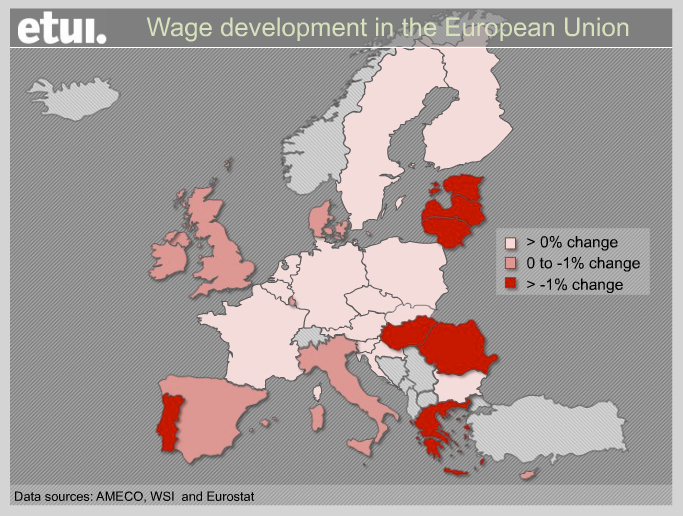Why care about quality jobs for quality services?
It is the European Union’s declared objective to develop an economy that proves smart, sustainable, and inclusive – hence an economy that turns Europe into a great place to live and do business. With services already contributing in excess of 65% to EU output and employment, it is clear that the services industry will have to play a key role in achieving this. Despite this, the European Union is currently lacking a clear strategy for making the services industry fit for the job.
With the Services Manifesto, UNI Europa has taken a first step toward developing a much needed, comprehensive EU services policy for jobs, competitiveness, and quality of life in Europe. To continue and refine this agenda over the coming years, UNI Europa will bring together trade unionists, policy-makers, and researchers to develop a strategy for harnessing the European services industry’s full potential for competitiveness and quality of life in Europe.
Read on to learn more about why Europe needs
- A new political approach to the governance of services
- Quality jobs for quality services
- Quality services to ensure competitiveness
- Quality services for quality of life
Europe needs a new political approach to services
To date, the European Union has not developed a coherent strategy for the European services industry. In fact, EU policy-makers display little ambition in supporting a favourable long-term development of our economy’s biggest sector. UNI Europa is deeply disappointed with this lack of ambition because we are convinced that integration based on a clear strategy for services could improve working conditions in services and boost competitiveness and quality of life in Europe.
The European Union’s most important project for our industry is of course the construction of the single European market for services. It is not difficult to imagine how this project could be a real win for the stakeholders of the European services industry, hence workers, businesses and consumers. Think of a single market that is consistently regulated to maintain high standards in terms of services quality and to ensure that competition remains fair. Such a market would encourage businesses to innovate and specialise in order to become more productive, hence to become better at what they are doing – and not just bigger. A single market of this kind would be a real win for European services workers, too. Businesses need a loyal, skilled, and motivated workforce to become champions in terms of innovation and quality – which is a strong reason for companies to invest in quality jobs.
The single market that was constructed over the past 20 years, however, looks pretty different from the one we describe above. It is the product of a piecemeal approach characterised by erratic deregulation, privatisation, and liberalisation measures. The result is a patchwork of loopholes, grey areas, and false incentives. As a consequence, fraudulent business practices, social dumping, and the emergence of oligopolies are widespread phenomena in the European services industry – with negative effects on the quality of services and services employment.
We have had enough of this! We demand that the European Union develops a more ambitious and coherent approach to the governance of services, including in the single market for services. The UNI Europa Services Manifesto represents a first, decisive step into this direction. We, UNI Europa, want to engage in a constructive debate over the coming years to develop feasible proposals for a long-term EU services policy that ensures that our industry boosts quality of life and competitiveness in Europe, now and in the future.
Europe needs Quality Jobs for Quality Services
In December 2013, unemployment in the EU of 28 stood at 10.7% with rates exceeding 25% in worst-hit countries. Yet even before the current crisis struck, employment growth in Europe mostly created jobs that are best described as precarious in terms of wages, job security, and worker safety. Many sectors of the European services industry are particularly affected by this development. By the end of 2013, this had led to a situation in which 123 million (!) Europeans were considered ‘at risk of poverty and social exclusion’ by the European Commission.

At the same time, executive pay and income from capital reached new, previously unknown heights. As a consequence, the Europe of today exhibits dramatic levels of social inequality. Social meltdown and a regression to 19th century class society are real possibilities under these conditions. The European Union needs to focus on creating permanent, safe, skilled, and well-paid employment – quality jobs – to counter this trend and to reaffirm its commitment to an inclusive European social model.
Being in need of more and better jobs, the European Union cannot afford to overlook its services industry. Realising that this industry already contributes in excess of 65% to both employment and output in the EU, it becomes obvious that services hold the biggest potential for the creation of quality employment.
Creating quality employment in services through, among others, targeted policies for skills, workplace safety, and worker participation appears all the more logical if one recognises the most defining characteristic of services: as a matter of their high labour-intensity, the quality of services as well as innovation capacity in services depends on a proficient workforce enjoying decent working conditions. In other words, targeted policies for quality jobs in services set loose a virtuous circle that leads to an enhanced quality of the services that are thus provided. Putting this virtuous circle into practice therefore pays a double dividend, both to those working in services and to those using the services that are thus provided.
Services for Competitiveness
We, UNI Europa, have always made clear that we are fiercely opposed to a race to the bottom in terms of wages, taxes, and regulation that some European leaders want to enter in order to grab up greater shares in global markets.
But Europe doesn’t have to go this far to become and remain a global economic champion. As, for instance, the cases of the Nordic countries or Germany show, developed economies can maintain their competitive edge by producing highly specialised, innovative goods and services of superior quality. With a highly educated workforce and a knowledge-intense economy being strengths that Europe can build on, this is clearly the direction the EU should follow. Not least, of course, because this approach is compatible with decent living and working conditions in the EU.
Our services industry can make a substantial contribution to such a quality- and innovation-oriented European model for growth and competitiveness. Our industry has the potential to become a champion of quality and innovative capacity – if the working conditions of those working in services are made consistent with this objective. As services are highly labour-intense, innovation capacity and quality in services is an outcome of proficient workers working under decent conditions. In other words: policies aiming at improving the quality of services must start by improving the quality of services employment. We – UNI Europa – think of this as a virtuous circle: quality jobs in services lead to quality services.
A strong services industry is a crucial prerequisite for the competitiveness of other sectors, too. Therefore, the entire EU economy will reap the benefits of this virtuous circle between quality jobs and quality services. Take, for instance, manufacturing: in order to produce those complex goods that stand out in world markets, European manufacturers rely on specialised services inputs such as design, ICT, or logistics services. If Europe is to succeed in strengthening its manufacturing industry, then there is no way around developing an innovative services industry providing services of superior quality.
Services for Quality of Life
A high quality of life in Europe without quality services is unimaginable. Imagine a Europe without supermarkets and stores that allow us to buy the goods that we rely on every day. Imagine what your workplace or school would look like without the work of cleaners. Who would manage your payments and savings if no bank employee took care of them? Some services are crucial to reap the benefits of those technological advances that make our lives a little bit easier, like the postal service that brings your online purchase to your doorstep. Other services are simply needed to adapt our societies to new realities, like care services that cushion the effects of demographic change.
In short, it is easy to see how we rely on services in order to live our lives like we do. In fact, we take the availability of many services so much for granted that we often only notice them when they don’t perform like we expect them to. Making sure that political framework conditions are set that are conducive to a high quality of these services is an essential task for a European Union that cares about the lives of its citizens.
A European strategy is needed to make sure that the services industry’s full potential for quality of life in Europe is harnessed. In the first place, this means developing an EU services policy that capitalises on the positive relationship between the quality of employment in services and the quality of the provided service itself. Realising this virtuous circle, and acting accordingly, will allow such an EU services policy to improve living and working conditions in Europe at the same time.

